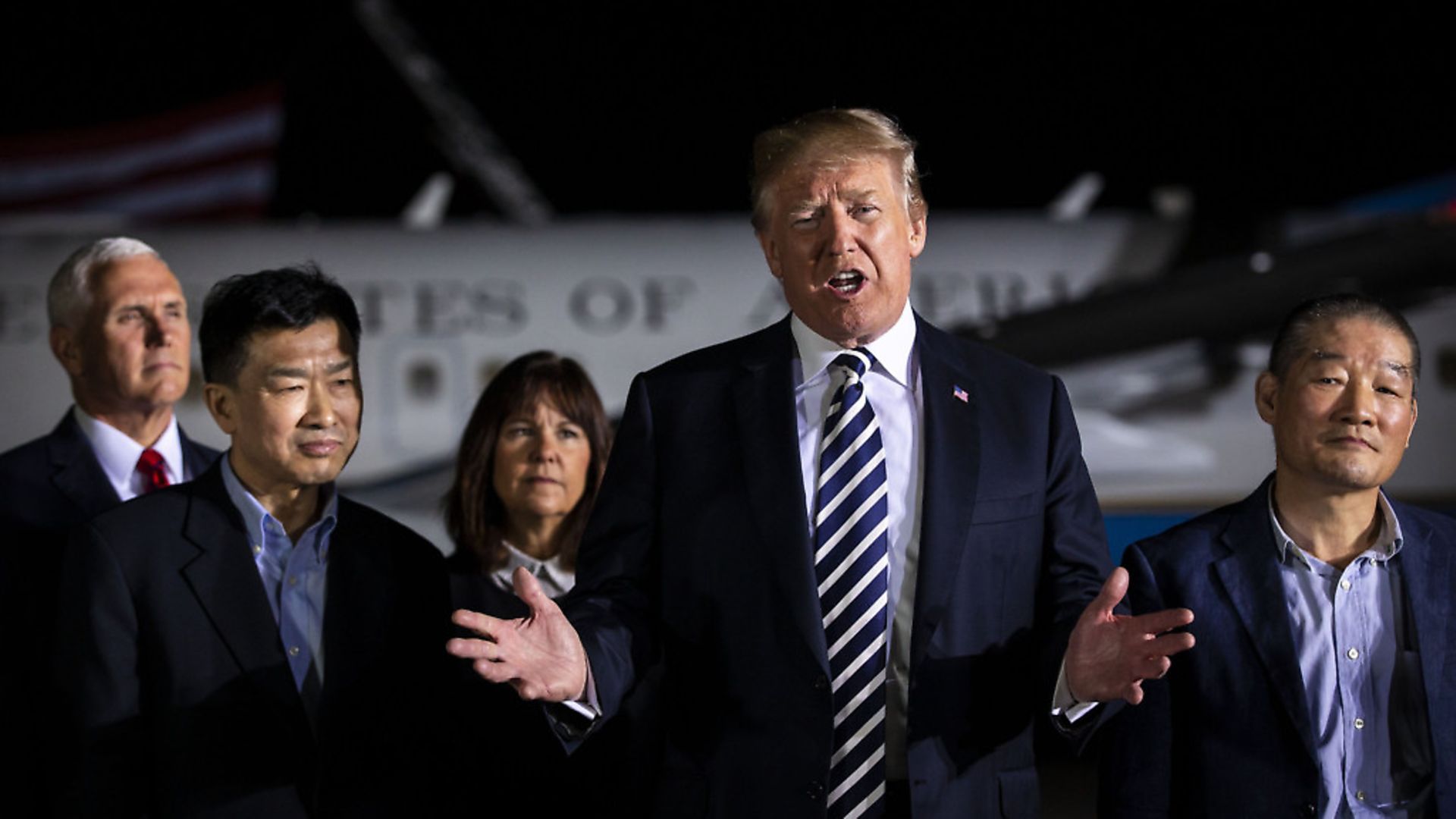
It will be an encounter between two of the world’s most unpredictable leaders. But former diplomat Paul Knott has some idea of what we might expect when Donald Trump meets Kim Jong-un
It is possible Donald Trump’s repeated threats to launch a military attack against North Korea are what jolted Kim Jong-un into the talks between the two men, which are to take place in Singapore next month.
Possible, but unlikely. The North Koreans are confident in the deterrent capacity of their ability to rain death and destruction on South Korea and Japan. Both countries are staunch US allies and home to many thousands of US citizens.
Like Trump, Kim is fond of issuing bloodcurdling threats that he does not necessarily intend to keep. He may feel that he has Trump worked out because, in the playground parlance that characterises their exchanges, ‘it takes one to know one’.
This calculation is the most plausible explanation for Kim’s decision to go straight to the highest level by proposing a summit. It is an approach that contrasts starkly with the established diplomatic method of building the framework of an agreement first, through negotiations between expert officials.
Kim probably judges that Trump’s ignorance and arrogance makes him an ideal negotiating partner. He has little to lose and much to gain by talking to Trump directly.
Trump is notoriously uninterested in detail and the North Korean nuclear issue is a complex one. He has repeatedly betrayed his ignorance about nuclear matters and the situation on the Korean peninsula. He thought, for example, that the two Koreas had signed a full peace agreement ending the Korean War, rather than merely adhered loosely to an armistice agreement freezing hostilities since 1953.
Trump’s self-mythologising egotism about his deal-making skills means he will be reluctant to be seen to fail and leave the talks empty-handed. The combination of Trump’s unfortunate personality with his domestic legal and political difficulties and desperation for a ‘win’ makes him vulnerable to being talked into a dud deal by the North Koreans. Such an agreement would initially involve the US easing sanctions against North Korea and subsequently reducing its military presence in South Korea, and possibly Japan. In return, Kim would offer some cosmetic freezes and minor curbs to his nuclear programme.
This offer would play into Trump’s isolationist instincts and oft-stated desire to withdraw the US from much of the world. Such an outcome would be warmly welcomed by Pyongyang’s Chinese backers. Kim notably paid a discreet, first-ever visit to Beijing at around the time he made his summit proposal to Trump.
Despite being regularly frustrated by the North Korean regime’s conduct, China continues to prop it up. This is because China’s frustration is outweighed by its fears of what could happen if North Korea collapsed. As the Chinese see it, such as collapse would enable US troops based in South Korea to move right up to the Chinese border.
Other than the rare opportunity to extract concessions from a feeble counterpart, there are few other good reasons for the North Koreans to pursue negotiations at the moment. They concluded long ago that having a nuclear weapons capability is their ultimate defence against US-directed regime change – even before a series of world events reinforced this view for them.
Iraq’s Saddam Hussein pretended convincingly to possess weapons of mass destruction and paid the price. Libya’s Colonel Gaddafi gave up his WMD programme but still perished in a popular uprising that the West eventually supported. Ukraine surrendered its Soviet nuclear inheritance in return for a security guarantee that Russia blatantly ignored by invading it. Starkest of all, Trump’s determination to shred the 2015 nuclear deal with Iran makes clear to Kim that an agreement with the Americans is not worth the paper it is written on.
There is nothing new either in the North Koreans seeking a summit with a US president. They have done so for decades now. Sensibly, none of Trump’s predecessors have been willing to grant them the status a summit conveys without prior evidence that Pyongyang was serious about disarmament negotiations.
For many years, the consistent pattern has been that North Korea would seek better relations with South Korea, and talks with the other key international parties, whenever sanctions were biting hard and its nuclear programme needed time to progress to the next stage. Once they had been granted some relief and their programme was ready to move forward, they always broke off discussions again.
The latest – positive but, thus far, largely symbolic – rapprochement with South Korea and release of three US prisoners could be part of a process of softening-up Trump before the summit. There, Kim may make some modest concessions on his nuclear programme, in return for an unequal trade-off. These steps will be designed to preserve the bulk of his nuclear arsenal and to be reversed easily at a later date. Certainly, more easily than it would be to reintroduce US military forces rapidly to the region.
In such long-running situations, dictatorships can have a certain advantage over democracies. Their continuity enables them to repeat the same ruses against new democratic governments, which tend to see each problem as new and requiring a fresh approach. The advantage is particularly pronounced against the Trump administration. It has diminished the US’s long-term institutional memory by cutting the State Department drastically and failing to staff it properly.
With talk of impeachment constantly in the air, Trump is sometimes compared to Richard Nixon. Nobody expected Nixon to pull off a successful deal to normalise US relations with China in 1972. But disreputable though Nixon was, he and his closest advisers, such as Henry Kissinger, were considerably more skilled in international political relations than Trump and his team. Trump may similarly surprise us at his summit with Kim. But the odds on that happening are probably longer than those on winning the jackpot at one of his bankrupt casinos.









